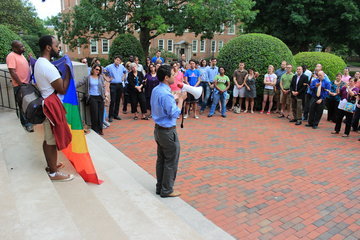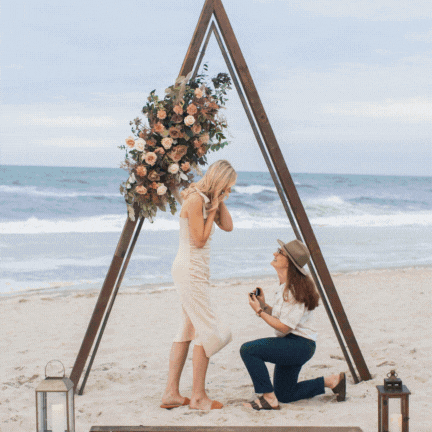Our editorial intern, Alyssandra Barnes, attends college at the University of North Carolina-Chapel Hill. She expresses her thoughts and feelings as an advocate of marriage equality in North Carolina, post-Amendment One passage.
By Alyssandra Barnes
The first time I voted, it was on North Carolina’s Amendment One bill. I voted a week early, surrounded by equal rights activists at the University of North Carolina at Chapel Hill. As a student there, for weeks I had seen dozens of light blue signs with yellow letters encouraging everyone to ‘Vote Against.’ Everyone seemed to adamantly oppose the bill, and I was one of hundreds of caring students who wanted gay and lesbian couples to enjoy the same marital rights heterosexual couples have. Finishing up finals for the school year, I thought there was a good chance Amendment One would not pass.

Students gathered for an Amendment One protest on the University of North Carolina-Chapel Hill campus
That is, until I came home. I’m from Brevard, a small mountain town in North Carolina, and within moments of crossing the city line I could see six ‘Support Amendment One’ signs. I had never seen signs like that before since (obviously) the Chapel Hill/Durham area is pretty liberal. My initial reaction was disgust, which increased with every church marquee and amendment sign I saw. Then it hit me; Brevard is probably a better representation of North Carolina as a whole than a liberal arts university town. Could the amendment actually pass?
Needless to say, the vote has been counted and North Carolina officially defines marriage as between one man and one woman. Millions all over the United States are disappointed, including the 832,000 North Carolinians who voted against the bill. Although Brevard, along with many other towns in this state, consider the passing of the bill to be a huge victory, I am far from giving up hope on my home state.
North Carolina’s amendment has done something wonderful for gay rights; it has people talking and jumping to action. Yes, the bill passed. That was overall not surprising since most of the state has extremely conservative roots based on family and tradition (the state is part of the Bible Belt after all). Especially in the western part of the state, generation after generation of families have attended the same high school and settled in the same town, enabling bigotry and uneducated fears to cultivate. And these are the people who are talking.
This talking is a good thing. For many years, the topic of homosexuality was either ignored or avoided. If it was brought up, the conversations were usually short and curt. But now all of that is shifting. Community members are explaining why they think gay marriage is either right or wrong, and opposition either way is quickly voiced. These conversations are inspiring. Equal rights will not happen while people sit idly and silent; it happens when conflict arises, opinions are voiced and the unrest is such that change is necessary. When the amendment was on the ballot, and even now, days after the decision was made, the way people voted is a hot topic of conversation here in North Carolina. Neighbors and friends are confronting each other on how they voted and why. Arguments have put strain on families and friend groups, and some people have lost life-long friends on this matter. But the point is, they’re talking. I’m proud of that.
People outside the NC community are also talking. President Barack Obama even voiced his opinion and not only said that he was disappointed in North Carolina, but that he supports gay marriage. (Thank you Mr. President.) Supporters both straight and gay are unifying to make sure Amendment One is overturned, and that an amendment like this isn’t passed in another state. People everywhere are joining together to make the voice of equal rights stronger and clearer. With a voice like this, I have no doubt marriage equality will come to fruition in the near future.
Photo: chapelboro.com





















